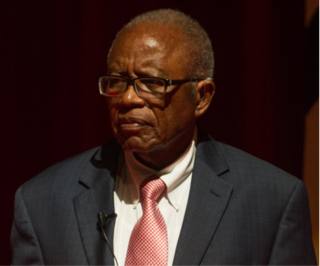Related Research Articles

The Civil Rights Act of 1964 is a landmark civil rights and labor law in the United States that outlaws discrimination based on race, color, religion, sex, and national origin. It prohibits unequal application of voter registration requirements, racial segregation in schools and public accommodations, and employment discrimination. The act "remains one of the most significant legislative achievements in American history".

George Henry Brandis is a former Australian politician. He was a Senator for Queensland from 2000 to 2018, representing the Liberal Party, and was a cabinet minister in the Abbott and Turnbull governments. He was later High Commissioner to the United Kingdom from 2018 to 2022.

The NAACP Legal Defense and Educational Fund, Inc. is a leading United States civil rights organization and law firm based in New York City.

The Racial Discrimination Act 1975(Cth) is an Act of the Australian Parliament, which was enacted on 11 June 1975 and passed by the Whitlam government. The Act makes racial discrimination in certain contexts unlawful in Australia, and also overrides state and territory legislation to the extent of any inconsistency.

The Australian Human Rights Commission is the national human rights institution of Australia, established in 1986 as the Human Rights and Equal Opportunity Commission (HREOC) and renamed in 2008. It is a statutory body funded by, but operating independently of, the Australian Government. It is responsible for investigating alleged infringements of Australia's anti-discrimination legislation in relation to federal agencies.

Anti-discrimination law or non-discrimination law refers to legislation designed to prevent discrimination against particular groups of people; these groups are often referred to as protected groups or protected classes. Anti-discrimination laws vary by jurisdiction with regard to the types of discrimination that are prohibited, and also the groups that are protected by that legislation. Commonly, these types of legislation are designed to prevent discrimination in employment, housing, education, and other areas of social life, such as public accommodations. Anti-discrimination law may include protections for groups based on sex, age, race, ethnicity, nationality, disability, mental illness or ability, sexual orientation, gender, gender identity/expression, sex characteristics, religion, creed, or individual political opinions.
Browder v. Gayle, 142 F. Supp. 707 (1956), was a case heard before a three-judge panel of the United States District Court for the Middle District of Alabama on Montgomery and Alabama state bus segregation laws. The panel consisted of Middle District of Alabama Judge Frank Minis Johnson, Northern District of Alabama Judge Seybourn Harris Lynne, and Fifth Circuit Court of Appeals Judge Richard Rives. The main plaintiffs in the case were Aurelia Browder, Claudette Colvin, Susie McDonald, and Mary Louise Smith. Jeanetta Reese had originally been a plaintiff in the case, but intimidation by segregationists caused her to withdraw in February. She falsely claimed she had not agreed to the lawsuit, which led to an unsuccessful attempt to disbar Fred Gray for supposedly improperly representing her.

Mendez, et al v. Westminister [sic] School District of Orange County, et al, 64 F.Supp. 544, aff'd, 161 F.2d 774, was a 1947 federal court case that challenged Mexican remedial schools in four districts in Orange County, California. In its ruling, the United States Court of Appeals for the Ninth Circuit, in an en banc decision, held that the forced segregation of Mexican American students into separate "Mexican schools" was unconstitutional because as US District Court Judge Paul J. McCormick stated, "The evidence clearly shows that Spanish-speaking children are retarded in learning English by lack of exposure to its use because of segregation, and that commingling of the entire student body instills and develops a common cultural attitude among the school children which is imperative for the perpetuation of American institutions and ideals." The Judge further ruled that, "The equal protection of the laws pertaining to the public school system in California is not provided by furnishing in separate schools the same technical facilities, textbooks and courses of instruction to children of Mexican ancestry that are available to the other public school children regardless of their ancestry. A paramount requisite in the American system of public education is social equality. It must be open to all children by unified school association regardless of lineage."

Fred David Gray is an American civil rights attorney, preacher, and activist from Alabama. He litigated several major civil rights cases in Alabama, including some, such as Browder v. Gayle, that reached the United States Supreme Court. He served as the president of the National Bar Association in 1985, and in 2001 was elected as the first African-American President of the Alabama State Bar.

Gillian Doreen Triggs is an Australian academic specialising in public international law. In 2019, she was appointed by United Nations Secretary-General António Guterres as Assistant Secretary-General of the United Nations. In this capacity, she will serve as the Assistant High Commissioner for Protection in the team of the United Nations High Commissioner for Refugees Filippo Grandi.

The Federal Circuit Court of Australia, formerly known as the Federal Magistrates Court of Australia or the Federal Magistrates Service, was an Australian court with jurisdiction over matters broadly relating to family law and child support, administrative law, admiralty law, bankruptcy, copyright, human rights, industrial law, migration, privacy and trade practices.

George Wallace's 1963 Inaugural Address was delivered January 14, 1963, following his election as governor of Alabama. Wallace at this time in his career was an ardent segregationist, and as governor he challenged the attempts of the federal government to enforce laws prohibiting racial segregation in Alabama's public schools and other institutions. The speech is most famous for the phrase "segregation now, segregation tomorrow, segregation forever", which became a rallying cry for those opposed to integration and the Civil Rights Movement.
Liberty Victoria, officially the Victorian Council for Civil Liberties (VCCL) and formerly Australian Council for Civil Liberties (ACCL), is a civil liberties group based in Victoria, Australia.
Housing discrimination in the United States refers to the historical and current barriers, policies, and biases that prevent equitable access to housing. Housing discrimination became more pronounced after the abolition of slavery in 1865, typically as part of Jim Crow laws that enforced racial segregation. The federal government began to take action against these laws in 1917, when the Supreme Court struck down ordinances prohibiting blacks from occupying or owning buildings in majority-white neighborhoods in Buchanan v. Warley. However, the federal government as well as local governments continued to be directly responsible for housing discrimination through redlining and race-restricted covenants until the Civil Rights Act of 1968.

Lesbian, gay, bisexual, and transgender (LGBT) persons in the U.S. state of South Carolina may face some legal challenges not experienced by non-LGBT residents. Same-sex sexual activity is legal in South Carolina. Same-sex couples and families headed by same-sex couples are eligible for all of the protections available to opposite-sex married couples. However, discrimination on the basis of sexual orientation and gender identity is not banned statewide.
Students for Fair Admissions, Inc. v. President and Fellows of Harvard College and Students for Fair Admissions, Inc. v. University of North Carolina are a pair of lawsuits concerning racial discrimination in affirmative action programs in college admissions processes. The first case involves Harvard University's undergraduate admissions process which is claimed to discriminate against Asian American applicants, while the second centers on the University of North Carolina's use of socioeconomic factors in administration, which is claimed to incorporate race and violate Title VI of the Civil Rights Act of 1964. Both cases seek review of the Supreme Court decision Grutter v. Bollinger (2003) which validated the use of affirmative action programs in college admissions as long as race is not used as the sole deciding factor.

Mississippi House Bill 1523, also called the Religious Liberty Accommodations Act or Protecting Freedom of Conscience from Government Discrimination Act, is 2016 state legislation passed in direct response to federal rulings in support of same-sex marriage. MS H.B. 1523 provides protections for persons, religious organizations, and private associations who choose to provide or withhold services discriminatorily in accordance to the three "deeply held religious beliefs or moral convictions" which are specifically outlined in the bill. These protected beliefs are 1) that marriage is and should be an exclusively heterosexual union, 2) sex should not occur outside of marriage, and 3) that biologically-assigned sex is objective and immutably linked to gender.
Title IX of the United States Education Amendments of 1972 prohibits discrimination "on the basis of sex" in educational programs and activities that receive financial assistance from the federal government. The Obama administration interpreted Title IX to cover discrimination on the basis of assigned sex, gender identity, and transgender status. The Trump administration determined that the question of access to sex-segregated facilities should be left to the states and local school districts to decide. The validity of the executive's position is being tested in the federal courts.
Section 18C of the Racial Discrimination Act 1975, deals with offensive behaviour "because of race, colour or national or ethnic origin" in Australia. It is a section of the Racial Discrimination Act 1975, which was passed by the Australian Parliament during the term of the Whitlam Government and makes racial discrimination unlawful in Australia. Section 18C was added by the Keating Government in 1995. The Section has been controversial and subject to much debate.
This article addresses the legal and regulatory history of transgender and transsexual people in the United States including case law and governmental regulatory action affecting their legal status and privileges, at the federal, state, municipal, and local level, and including military justice as well.
References
- ↑ "Appointments to the Federal Circuit and Family Court of Australia (Division 1)". Our ministers – Attorney-General’s portfolio. 15 October 2021. Retrieved 30 January 2022.
- ↑ "President of the Australian Human Rights Commission facing possible defamation action". ABC News . 9 November 2016. Retrieved 19 April 2017.
- ↑ "Lawyer criticises Gillian Triggs as 18C university case thrown out". SBS World News . 4 November 2016. Retrieved 19 April 2017.
- 1 2 Forrester, Joshua. Zimmerman, Augusto. Finlay, Lorraine (7 November 2016). "QUT discrimination case exposes Human Rights Commission failings". The Conversation . Retrieved 19 April 2017.
{{cite news}}: CS1 maint: multiple names: authors list (link) - ↑ "Identity politics, political correctness and Section 18C of the Racial Discrimination Act". Sterling Law. 4 August 2017. Retrieved 26 December 2018.
- ↑ Chan, Gabrielle (4 November 2016). "QUT computer lab racial discrimination lawsuit thrown out". The Guardian Australia. Retrieved 4 December 2016.
- ↑ Jarrett, Michael (judge) (4 November 2016). "Prior v Queensland University of Technology & Ors (No.2) [2016] FCCA 2853 (4 November 2016)". Australasian Legal Information Institute. AustLII . Retrieved 4 December 2016.
- ↑ Gordon, Michael (7 November 2016). "Gillian Triggs hits back at 'deeply misleading' Malcolm Turnbull over 18C claims". Sydney Morning Herald . Retrieved 19 April 2017.
This article needs additional or more specific categories .(January 2022) |